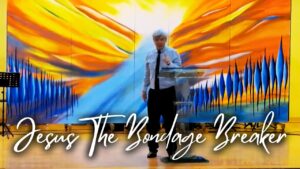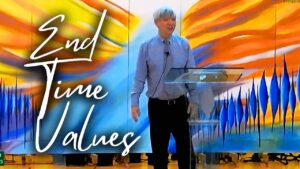There is only one fast specifically mentioned in the Old Testament; the Day of Atonement, which was observed in the 7th month. To this day fasting is an essential part of the religious life in the east. The Mohammedans strictly keeps the fast of Ramadan which is one whole month. The Jewish fasting customs were exactly the same. It is to be noted that, fasting lasted from dawn to sunset; outside that time normal meals could be eaten. Such then was the Jewish practice of fasting. It is quite similar to Evangel Tabernacle month of fasting. This year we will be fasting for breakfast (the start of dawn) and lunch and we break our fast, during dinner time (during sunset).
Then the Jewish leaders appointed additional fast day to remember specific times of stress (strain, anxiety, pressure, tension) in Israel national history. I would agree with the specific month of fast which I think is biblical. Also of course we too have additional fast day during times of stress. But the Rabbis increased the times of fasting to twice a week; Monday and Thursday. Thursday because that was the time, they said Moses went up to Mount Sinai. And Monday because they say that was the time when Moses came down. This is why Jesus mentioned the word ‘hypocrites.’That is the trap that the Pharisees fell into and we must not. The great danger of the Pharisees was that his fast was a sign of superior piety, that his fasting might be a deliberate demonstration, not to God but to men, of how devoted and disciplined a person he was. The Pharisees’ days of fasting were Monday and Thursday. These were market days, and there, people from the whole country crowded into the towns and villages, and especially into Jerusalem. The result was that those who were ostentatiously fasting would on those days have a bigger audience to see and admire their piety. There were many who took deliberate steps to see that others could not miss the fact that they were fasting. They walked through the streets with hair deliberately unkempt and dishevelled, with clothes deliberately soiled and disarrayed. They even went the length of deliberately whitening their faces to accentuate their paleness. This was no act of humility; it was a deliberate act of spiritual pride and ostentation.So, we understand why Jesus mentioned hypocrites when it comes to fasting.
I don’t quite agree with the Rabbis increasing the frequently of fasting because I think it become a self-effort; a type of work: as a merit before God. To me it is wrong motivation. But then what does Jesus say concerning fasting?
- Jesus approves of fasting
The saying in Matthew 6:16-18 is given by Jesus. Jesus set the precedent Himself. Matthew 4:2 says, ‘And when he had fasted forty days and forty nights, he was afterward an hungred.’ Jesus fasted. The early church fasted. Jesus is very clear here. He chose to say ‘when you fast’, which proves that we are supposed to fast. He did not say ‘if you desire to fast’ or ‘if you so choose to fast.’ No. To Jesus it was a given that we are to fast.
Fasting is not a way of showing off one’s spirituality but of drawing closer to God and seeking His guidance. When you fast, your goal is to be seen by God, not men. Jesus classified fasting as a religious exercise, with almsgiving and prayer. Wow almsgiving. Actually, it was said that those who could not fast, (pregnant women, going to war, health reasons) should then give alms to replace their fasting. Jesus said we will receive a reward when we fast. What are the rewards?
- The Physical Rewards
We are calling all Evangelites to a time of Fasting and Prayer. But we want to get rid of a few misconceptions and talks about its rewards. One of the most common misconceptions is that fasting will be detrimental to our health and causes gastric. I don’t think so if you do it the correct way.
In the Special Newsweek Edition concerning global issues, ‘the limits to our longevity’, was discussed. Scientists are trying to come up with medical treatments that will dramatically increase our life spans. I met a Singaporean in Cambodia who believes that he will live to 120 years old. His method was proper food intake, especially ginger every day. Well, he can plan, but God is the ultimate decider. The last I heard from him is that he had an accident and lost his memory. He cannot remember people around him. Zoologist Steven Austad believes that it’s not only possible but also likely for a man to live up to 150 years old. In fact, Austad put $300 into a trust fund and believe that 150 years later his offspring will draw it out and it will be worth half a billion dollar in the year 2150. In his research it was discovered that some individuals age more slowly than others. It was also stated that we are killing ourselves by overeating. You don’t see old people that are fat. Joy, as a research scientist deals with mice practically every day of her life. She will tell you that the smaller mouse is believed to live 50 percent longer than the obese mouse. Joy’s research has to do with obesity. Scientists have known since the 1930s that rats and mice live 30 to 60 percent longer when their food intake is reduced by similar proportions. That is if you eat 30 percent lesser, you live 30 percent longer. If you eat 60 percent lesser, you will live 60 percent longer. The underfed mice have significantly lower cholesterol, blood pressure and insulin and the fully fed animals have experienced almost twice as much disease as the dieters. Most of us live a life without exercise and therefore it is easy to get soft and flabby. It is even possible for a man to reach a stage where he lives to eat instead of eating to live. The reason he is living is because he loves eating. Jesus has already prophesied concerning the problem of today. He said that in the last day, the people will be like the time of Noah, where they will be eating and drinking. And it is not the other way around where he needs to eat so that he can live (be alive). It would do a great many people a great deal of physical good to practise fasting far more than they do. In the 20 months in Singapore, Pastor Lily and I had access to a lot of good food. Honestly, I put on 10kg that until today I still cannot shed it. But Pastor Lily and I can tell you that our health was not like before because we ate too much. It is so scary that in the span of just 20 months because of food, or too much eating, our health deteriorated so fast. The blood pressure has gone up and cholesterol has gone up and definitely our health has deteriorated. So, we thank God that we are back in the Philippines to regulate our food intake and thus improve our health.
If you are pregnant, we don’t advise you to fast. And if you are travelling, you should not fast but must compensate by fasting on another time. And if you cannot fast but must have food, then you have to compensate by giving alms to the poor. This is taught in the bible.
What are other physical rewards? Many years ago,Sis Florence Ng, the wife of Pastor Philip Ng had a sudden growth on her neck that was solid as a rock and it was big that cover a big portion of her neck. She consulted a doctor and the doctor told her that it could be malignant and needs operation. I saw her neck growth personally. Instead of going for operation and allowing fears to grip her, she entered into a fast, abstaining from all meats, but just drinking carrot juices every day and partaking of vegetables and fish. After one month the size of the growth on her neck shrank and she felt healthier. 2 months later, it was completely gone. Today Sis Florence Ng is still alive.
So, we can safely say that there are physical rewards to fasting. What are they? It enhances brain function. When one fast, their brain function is greatly improved. It restores immune system. There is an article that called ‘fasting for 72 hours.’ It states that it can reset your entire immune system. I believe this is a full fast. Fasting also aids healthy metabolism and anti-aging. The latest study to explore the impact of fasting on the human body concludes that it increases metabolic activity more than previously realised and may even impart anti-aging benefits. Finally fasting detox, the body.
- The Spiritual Rewards
We see bible examples of fasting and its rewards. John the Baptist’s disciples fasted (went without food) to repent of sin and prepare for the Messiah’s coming. Fasting seems to be correlated with repenting of sin. Jesus did not condemn fasting – he himself fasted. However, he emphasised that fasting must be done for the right reasons. The goal of John the Baptist concerning fasting is godly. He has two goals: to cause people to repent of their sin, and to prepare them for Christ’s coming. The message of John the Baptist was a sobering message, and so he and his followers fasted. First, let’s get this clear because it can be a misconception amongst the Christian Church. Fasting will not atone you for your sin. Only repentance and the cleansing in full. But then fasting is both an outward sign of humility and regret for sin, and an inner discipline that clears the mind and keeps the spirit alert. Fasting helps to clear the mind and enables a person to have a keener perception of divine things. Faith comes easier and clearer in seasons of fasting. Fasting empties the body of food; repentance empties the life of sin. There are some people who never obtain repentance because they never ask for it. There are even some people who even tried repentance but failed. Then I should say they should try asking for God’s help. There are some good examples in scriptures of people who were serious about repenting, and who did it with fasting and humility. One good example is Jonah 3:5-7 which says, ‘So the people of Nineveh believed God, and from the great of them even to the least of them. For the word came to the King of Nineveh, and he arose from his throne and he laid his robe from him, and he caused it to be proclaimed and published through Nineveh by the decree of the king and his nobles, saying, let neither man nor beast, herd nor flock, taste anything: do not feed them nor drink water.’ I believe it was a full fast. What happen? The whole city of Nineveh was saved. The next example was Saul of Tarsus. Acts 9:9 says, ‘And he was three days without sight, and did not eat nor drink.’ This refers to Saul after he was converted on the Road to Damascus. Three days without food and water is a sincere seeking of God. When a person sees the seriousness of judgment against them, then God is calling them to repentance. Are you very discouraged of your spiritual condition? Do you see yourself fighting a losing battle against sin? Has some judgment fallen on you or your family lately? Is trials getting out of hand in your life recently. Are you serious about repentance? Is God calling you to repentance. Then you should be like the people of Nineveh and Saul of Tarsus. Turn to God in prayer and fasting. God himself said it, ‘Therefore also now says the LORD, turn yourselves to me with all your heart, and with fasting and with weeping and with mourning,’
Fasting to mourn over person sins and failure. Fasting is an expression of mourning. As people feast at weddings and other occasions of rejoicing, so they fast at occasions of mourning. If we have sinned and are grieved in penitence, it does good to our soul to fast as we turn our hearts from sin and confess our failures and faults to God. Fasting fits exactly with repentance and with sorrow for sin. Fasting break up the fallow ground of our heart. Often times we have no real sense of sin, no genuine horror at our guilt. We know that our lives are not pleasing to God but we have no desire and power to change. But when we are deeply convicted over the sinfulness of our lives and desiring to separate more fully from the world and be joined more closely to God, fasting is the key. When we want to intensify our devotion to God, we should undertake fasting. Fasting assists us to mourn over our sin and failure and implore God to change us. The fast was only designed to be the outer expression of an inward sorrow. Fasting was a deliberate attempt to prove that penitence was real. Fasting was a guarantee of the sincerity of words and prayers. Fasting helps to rid our hearts of pride, and humble us before the Lord. The Psalmist said, ‘When I humbled my soul with fasting, it became my reproach’. Fasting brings us to a state of humbleness that is acceptable to God.
Fasting to honour God. In the subconscious mind of most Christians is the feeling that fasting is not necessary or God honouring in this age of grace. Fasting can be considered one of the greatest sacrifices we can render to God. Therefore, when we fast, we are honouring God as a person worth our sacrifices. God asks the Jews in Zechariah ‘Was it really for me that you fasted’. Fasting is a way to strengthen our love for God. Jesus indicated the person fasting must fast unto the Lord, going about his business in the usual way and keeping his fast before God. Anna was a prophetess who devoted herself to the Lord by fasting and praying day and night because she has learned to honour God with her life by fasting and prayer in the temple.
Fasting to humble ourselves before God. In order to experience more grace and God’s intimate presence. Fasting was a deliberate attempt to draw the attention of God to the person who fasted. This was a very primitive idea. The fasting was designed to attract God’s attention, and to make him notice the person who thus afflicted himself.
To seek grace for new task and to reaffirm our consecration to God. The COIVD-19 never seems to go away and right now Iloilo City is under level 3. I think we have to turn to God to assist us. We need faith and stamina to go about the task of rebuilding and regathering. And fasting will give us grace for the new task and affirm our dedication to God for this project.
To seek God by drawing near to him and persisting in prayer against opposing spiritual forces. Scripture shows us that God will overthrow the enemies of His people if we seek Him through fasting. ‘And Jehoshaphat was afraid and turned his attention to seek the Lord; and proclaimed a fast throughout all Judah. And when they began singing and praising, the Lord set ambushes against the sons of Ammon, Moab, and Mount Seir, who had come against Judah; so they were routed. Satan has strongholds today similar to those of the kingdom of Persia. We need to pray and fast as Daniel did to bring down these strongholds, and reclaim the territory for God. Fasting enables us to be more sensitive to spiritual activity and to be a greater asset to God as He works His will through us.
To gain revelation and wisdom concerning God’s will. Sometimes fasting was a preparation for revelation. Moses in the mountain fasted for forty days and forty nights. Daniel fasted as he awaited God’s word. Jesus himself fasted as he awaited the ordeal of temptation. This was a sound principle, for when the body is most disciplined, the mental and spiritual faculties are most alert.
To open the way for the outpouring of the Spirit and Christ’s return to earth for his people.
- Fasting for the Father’s reward
Matthew 6:18 ‘That thou appear not unto men to fast, but unto thy Father which is in secret: and thy Father, which seeth in secret, shall reward thee openly.”
The word for ‘reward’ in the NASB is ‘repay’. It is probably a little too mercenary. It seems to suggest a business deal: We do the work of fasting and God pays up with wages. It simply means “give back” or “make a return.” In some places it may be money. In others it may be justice. In others it may be God’s gracious response to an act of faith and prayer. The reward can be in heaven or earth. So we will be more blessed to receive a reward from our Father. That’s what it is here, I believe.
Carl Lundquist was the president of Bethel College and Seminary for almost 30 years. He died about four years ago from skin cancer. In the last decade of his life, he devoted a lot of energy to studying and promoting personal spiritual devotion and the disciplines of the Christian life.
He even established what he called the “Evangelical Order of the Burning Heart” and began to send out a letter of inspiration and encouragement. In the September 1989 letter he told the story of how he first began to take fasting seriously.
“My own serious consideration of fasting as a spiritual discipline began as a result of visiting Dr. Joon Gon Kim in Seoul, Korea. “Is it true,” I asked him, “that you spent 40 days in fasting prior to the evangelism crusade in 1980?” “Yes, ” he responded, “it is true.” Dr. Kim was chairman of the crusade expected to bring a million people to Yoido Plaza. But six months before the meeting the police informed him they were revoking their permission for the crusade. Korea at that time was in political turmoil and Seoul was under martial law. The officers decided they could not take the risk of having so many people together in one place. So Dr. Kim and some associates went to a prayer mountain and there spent 40 days before God in prayer and fasting for the crusade. Then they returned and made their way to the police station. “Oh,” said the officer when he saw Dr. Kim, “we have changed our mind and you can have your meeting!”
God sees us fasting. He sees that we have a deep longing that is pulling us to fast. He sees that our heart is not seeking the ordinary pleasures of human admiration and applause. He sees that we are acting not out of strength to impress others with our discipline, but out of weakness to express to God our need and our great longing that he would act. And when he sees this, he responds. He acts. We have seen him acting in those years in 2000 to 2010 when the church really started to grow. We see God working in some remarkable ways. People who have been hard to the gospel are opening up. I remember in the early years of our ministry it was so hard to reach the Catholic. They throw stones on our rooftop when we pray too loud. But now, people are so open to the Gospel. People closed off to reconciliation are opening up. People who are lukewarm and indifferent are awakening to the greatness of God and their salvation. The world seems to be fighting a losing battle with the COVID-19, How do we know? Our reward could be the making ineffective the COVID-19 on human lives.





